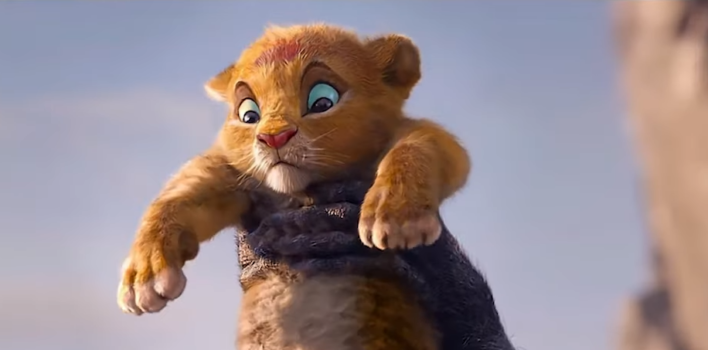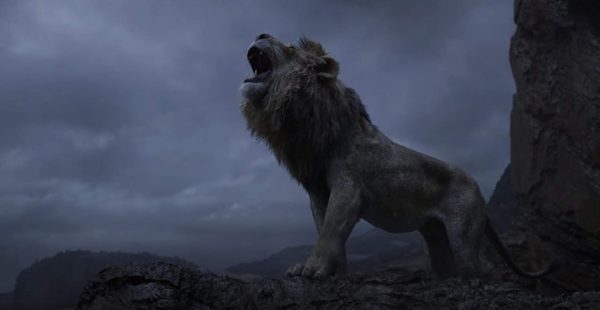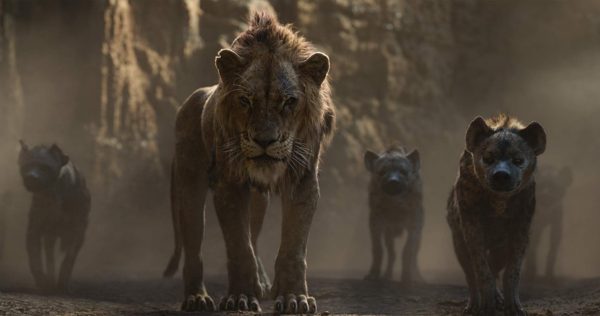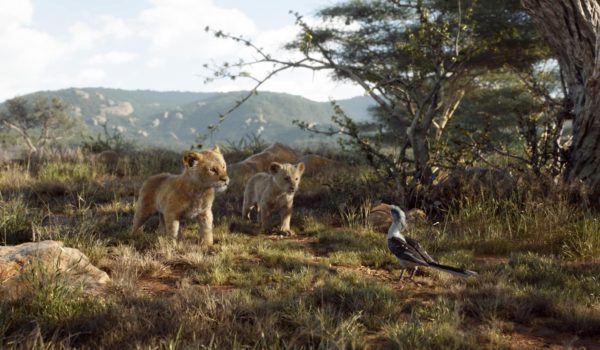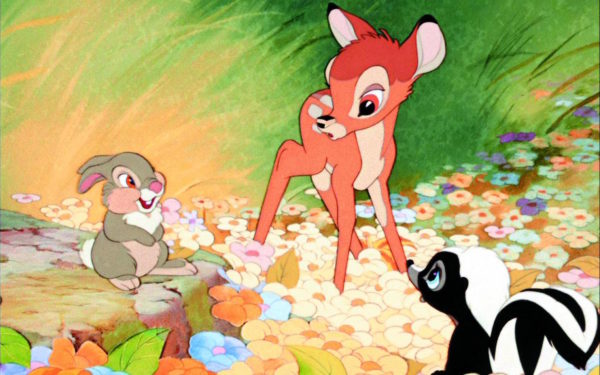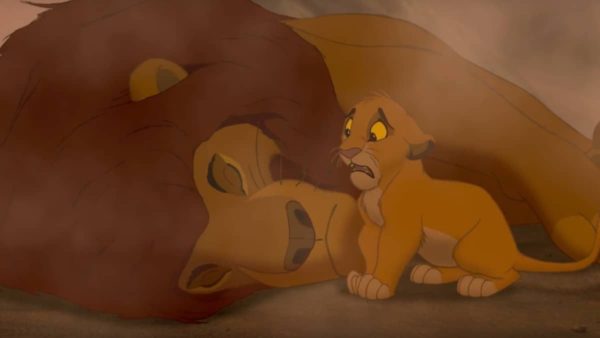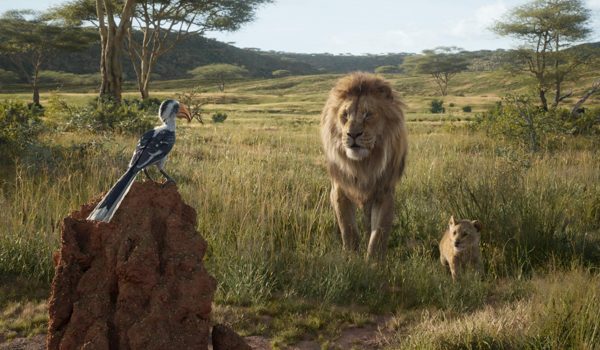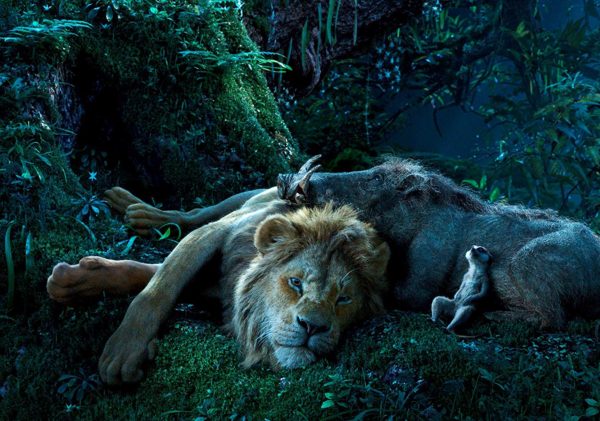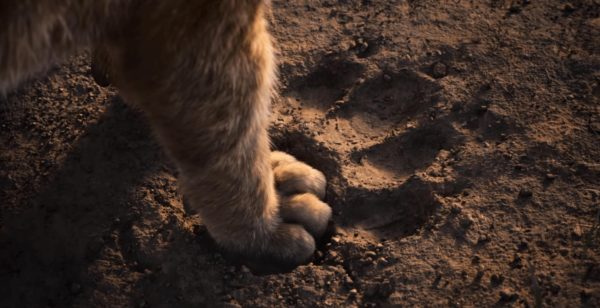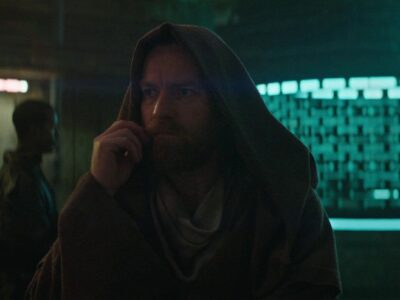Review| The Lion King (2019) – All Roar, No Heart
My relationship with the 1994 Disney animated classic The Lion King has been rather tumultuous over the years. I knew it was a great film, but that fact was often overshadowed by its overplay in the public consciousness to the point where there didn’t seem to be anywhere in the cultural sphere that the film didn’t permeate. 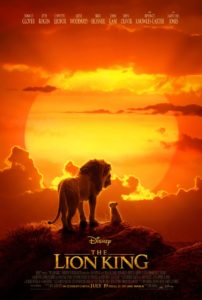
That my sister, who was seven years old at the time, played The Lion King on a seemingly endless loop in our house also contributed to my ambivalence toward the film.
In preparation for this review, I rewatched the original film the day before seeing the new “live-action” remake. I found myself rediscovering why The Lion King has the staying power it does and why the film is truly timeless. The 1994 film is an animation masterpiece on par with what was done by Walt Disney himself and his original set of genius master animators. The Lion King has a wonderful mix of drama, comedy, music, charm, and a story that is both epic in scope and intimate enough to be relatable.
The same cannot be said for this “new” version of The Lion King. Oh sure, it goes through the beats of the story, and the animation is impressive enough, but this film had no heart and no soul. The charm was gone, and it left me asking the question, “Why does this film exist at all when the 1994 original is vastly superior?” Then I saw the box office news and it all made sense.
Disney’s recent string of live-action remakes of its classic animated features has been hit-and-miss. I’ve enjoyed a few of them (Cinderella in particular) and really disdained others (Beauty and the Beast). My feelings for the latter category stem from a frustration with the Disney talent pool’s refusal to do something new or interesting with these properties while still maintaining the spirit of the original. And The Lion King (2019) was probably the worst of these.
I WOULD SAY “SPOILERS AHEAD,” BUT…
The Good: Impressive Animation and Music
Not everything about this new Lion King was bad. The goal was to create photorealistic animals in a natural environment and, for the most part, director Jon Favreau and his crew succeeded. The animation was arguably well done. The characters did indeed look like real animals and behave like real animals (which is also part of the problem, but more on that later). Favreau also intended the film to resemble a nature documentary, and there are several scenes in the film where that approach could really be felt.
The great Hans Zimmer improved and refined his wonderful, Academy Award-winning score from the first film—mainly with more diverse instrumentation and arrangements. The score sounded decidedly more “African” than it did, with less of an emphasis on synthesized music (a hallmark of Zimmer’s scores in the 1980s and 1990s). Zimmer himself said that the score for the first film was rushed and he took it as a challenge to go back and try to “fix” some things. This new score, however, didn’t diminish the brilliant score from the first film. I actually prefer the original, but I can appreciate the care Zimmer took to make the 2019 score richer.
The Bad: Everything Else
It’s as simple as this: The Lion King (2019) was a hollow husk of a film. While technically and visually interesting, it sapped all the charm and fun from that simple and profound story and repackaged it into a boring, lifeless film.
There were so many ways that this film failed, but I wanted to focus on a couple that I think were probably the most egregious.
The voice work on all the characters was bland at best and grating at worst. The insufferable voice of John Oliver made Zazu annoying instead of endearing. John Kani was a boring Rafiki (though I should probably blame that more on screenwriter Jeff Nathanson for a personality-free characterization). Billy Eichner annoyed me as Timon and Seth Rogen had no resonance or emotional range for Pumbaa. And Chiwetel Ejiofor had none of the panache and evil charm that made Jeremy Irons’ Scar one of Disney animation’s best villains (but boy, did he lay on the scenery-chewing for the awkwardly short “Be Prepared” number).
Particularly grating were Donald Glover and Beyoncé as adult Simba and Nala, respectively. Glover sounded lazy and unenthusiastic (which is, really, the way that he sounds in most of the films and TV shows in which I’ve seen him). Queen Bey simply cannot act, try as she did. Their rendition of “Can You Feel the Love Tonight” was hilariously one-sided, with Glover continuously enveloped by wave after wave of Beyoncé’s vocal histrionics—unable to surface for air.
The most heartbreaking performance was, ironically, the only actor to reprise their role from the original film. James Earl Jones, who powerfully voiced Mufasa in 1994, was a shadow of his original performance. He seemed old and tired with little vocal inflection and enthusiasm (he is, of course, 25 years older). This surprised me because Jones sounded very robust and lively returning to the role of Darth Vader for Rogue One: A Star Wars Story only three years ago.
I don’t think Jones was into it, and his performance seemed to prove that. It was sad to hear such a powerful and dynamic character like Mufasa sound so defeated and tired—almost like he knew the stampede was coming. It was kind of a metaphor for the entire film, really.
These voice performances were then married to the photorealistic visuals, which created an emotional disconnect. When the performances actually got genuinely emotional, the faces of the animals didn’t convey this well enough.
Why? Real animals don’t facially emote like human beings.
The realistic animation worked too well and the characters weren’t able to properly emote. The end result was an uncanny valley effect that was awkward at best and jarring at worst. And this was the intention of the filmmakers, as stressed by Jon Favreau, as he broke down the film’s opening in the video below.
This was the film’s most glaring flaw—and caused me to not care about any of the characters on screen.
The great Warner Bros. animation director Chuck Jones once quipped that “animation means ‘to invoke life,’ not imitate it.” In other words, the best animation is an illusion that creates a sense of character and simultaneously a sense of weight and realism. Animation is also an exaggeration of life that bends the rules of realism just a bit to achieve a story’s desired emotional effect—be it laughter or drama.
The best animation follows those principles and The Lion King (2019) doesn’t. What’s sad is that this basic principle has been understood since Walt Disney and his original animators were creating films.
With Bambi in 1942, Walt Disney stressed the realism and realistic behavior of the animal characters to his animators—even to the point of bringing actual deer and other woodland creatures into the studio. The characters had realistic anatomy, moving and behaving like real animals. However, the characters’ facial expressions were exaggerated so they could emote like humans—creating an emotional connection to the audience. It was both stunningly beautiful and emotionally gripping.
The 1994 version of The Lion King continued that Bambi animation legacy. All the animals moved like animals, having the muscle mass and physicality of a lion, meerkat, mandrill, what have you. But they could also clearly emote in their faces and eyes—something that real animals can’t do. We could literally see and emotionally read the anguish in Simba’s face when he discovered that his father was dead and immediately sympathized with him. Some people (not me, or course) shed tears just thinking about that scene! (I’m not crying, you are!)
The 2019 Lion King was too much of a slave to realism and left the characters with a peculiar disconnect between the emotion of the voice (when it was clear) and the non-emotional faces of the animals. Any emotions I felt (and more than likely you felt as well) during key scenes like Mufasa’s death were derived from our memories of the emotions of the original film. Zazu was probably the most glaring example, as he had absolutely no change to his face whatsoever, no matter what was being said (because birds don’t smile, frown, etc.). It limited the characters’ emotional range.
Any deviation from realistic animal behavior in the 2019 film seemed awkward and unreal, adding another note of off-putting peculiarity to the film. The “I Just Can’t Wait to be King” segment was boring. The characters couldn’t really do anything comparable to the original. It had none of the visual excitement and exaggeration of the original because the realism of the film’s tone prevented things like a visually interesting tower made up of animals from appearing. Instead, we got a bunch of realistic animals running around in circles, emotionally singing with unemotional faces.
No Worries and Responsibility
The emotional inadequacies of The Lion King (2019) obfuscated the rich themes of the original story. For a film with such a simple plot, there’s a lot to unpack—with allusions to themes like power, grace, and responsibility.
That last concept is the one that really resonated with me during my recent viewing of the 1994 original. Upon the death of his father, Simba fled the Pride Lands and ended up in a lazy, selfish lifestyle—enjoyable as it may have been in the moment. This “problem-free philosophy” enabled Simba to shirk his responsibilities as the true king and give in to his fear of what might happen should he return.
As we grow into adulthood, we gain more and more responsibility in our lives. It’s a sign of true maturation when we can handle the big responsibilities of life like holding down a job, maintaining a marriage, raising children, and the like. These responsibilities tend to make us less selfish over time. Indeed our Creator built us to have these types of responsibilities, going all the way back to the first human beings in the Book of Genesis.
However, like Simba, sometimes we allow ourselves to run away from our responsibilities. We are afraid to take on the burdens of adulthood because we want to be selfish and live a “problem-free” life. But there are consequences to the choices we make, and nothing is truly is “problem-free.”
Today’s culture at large seems to share a fear of growing up and responsibility. I see it all the time walking around places like malls where twenty-somethings are dressed in childish things like onesie pajamas made for adults while they sip on their Starbucks—and the culture is more than happy to cater to their every whim. Many young people are waiting longer and longer to marry and have children because of this fear and aversion toward responsibility.
“When I was a child, I talked like a child, I thought like a child, I reasoned like a child. When I became a man, I put the ways of childhood behind me.”
—1 Corinthians 13:11
As King Solomon said, there is nothing new under the sun, and shirking responsibility has been going on as long as there have been human beings. It is an affliction common to everyone—even the heroes of the Bible.
Many biblical characters have tried at one point or another to pass off their responsibilities—even those bequeathed to them by God Almighty Himself. Moses tried to convince God that He had the wrong man to lead His people out of Egypt. Jonah literally ran away from the task God gave him. In the New Testament, Jesus told a parable about a son who ran away from his responsibilities at home and threw his inheritance away on a hedonistic lifestyle.
We were created to bear the responsibilities of life, responsibilities our God has given us. And when we try to avoid them, like Simba did, things seem out of balance. The amazing thing is that God seems to always have a way of setting things right, but only if we are open to following His plan and eventually accepting our responsibilities.
However, some people are more receptive to God’s call than others. In the case of Jonah, he was so stubborn and averse to fulfilling the task God had given him that God had a whale swallow Jonah to teach him that he couldn’t run away from his responsibilities. God gave Jonah mercy and an opportunity to set things right again.
In Jesus’ parable, the prodigal son returned home battered and broken from the hard living he had been doing. His father celebrated his son’s return, even though he had every reason to cast him out again. What Jesus was explaining was God’s forgiving nature; His inexhaustible ability to not excuse our irresponsibility, but provide grace for those moments—welcoming us back with open arms and a joyful heart. His grace and new mercies empower us to be better and want to take on those responsibilities in our lives.
Indeed whenever we sin and go against God, we are, in effect, rebelling against His plan for us and shirking the responsibilities He has placed on us. But again, God has a way to make things right and He did that through Jesus Christ. The mercy and grace God showed us and continues to show us should be more than enough for us to return to what God has planned and accept His will with humility. We must have faith that God is with us to help us bear those burdens of life and do so with joy and peace.
The Final Word
Disney’s The Lion King is a modern animation masterpiece—worthy of being held next to animated classics like Pinocchio, Snow White and the Seven Dwarfs, and Cinderella. The Lion King 2019 is a hollowed-out copy that is bereft of all the original’s heart and meaning. It is a joyless and soulless cash-grab, plain and simple—grafting the genuine emotions from the original onto new versions of these beloved characters who cannot visually convey those emotions. If you must see one of these films, see the 1994 original. It is a superior film in every conceivable way.
Like Simba, we may feel like shedding the responsibilities of life and live problem-free. But that is not the way we were meant to live. We learn through responsibility, and our Creator has many lessons to teach us through the burdens we bear in this life. And we have assurance from God Himself that He will be there to give us the strength and wisdom to approach these responsibilities with a thankful heart.
• • •


